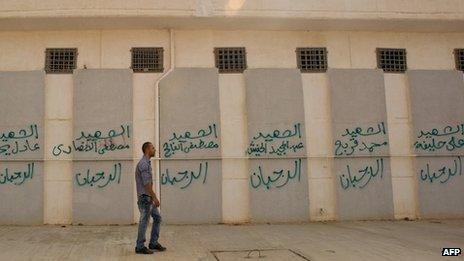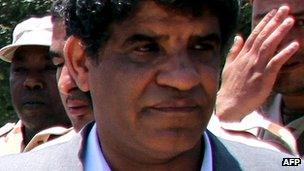Libyans in first Abu Salim jail massacre remembrance
- Published

The names of those who died in Abu Salim have been written on the prison walls
Libyans are for the first time publicly marking the anniversary of a prison massacre in which nearly 1,300 inmates were shot dead 16 years ago.
The prisoners at the notorious Abu Salim jail in the capital, Tripoli, were killed after a protest demanding better conditions and fairer trials.
Since the overthrow of long-time ruler Muammar Gaddafi last year, the jail has become an exhibition gallery.
Gaddafi's brother-in-law is accused of giving the order to shoot.
Abdullah al-Senussi, who served as head of military intelligence, was arrested in Mauritania last November, a month after Col Gaddafi was killed - ending the eight-month uprising.
Secret notes
The BBC's Rana Jawad in Tripoli says the Abu Salim prison is now a site where former inmates, their families and others can publicly pay their respects to the 1,269 prisoners gunned down in 1996 and those who were incarcerated there for years on end.

Abdullah al-Senussi was seen as late Libyan leader Muammar Gaddafi's right-hand man
Libyans have been streaming in to look at items exhibited in one of the prison's inner courtyards, including prison slippers, pictures of those killed, and secret notes written by inmates, she says.
US-based rights group Human Rights Watch says Libyans can finally hope for justice, adding that suspected perpetrators of the killings should be treated humanely and get fair trials.
Our reporter says justice is still on a rocky path in post-revolutionary Libya, with old scores being settled at times with the gun.
However, the judiciary has recently started prosecuting members of the former government, she says.
Nicknamed "the butcher", Mr Senussi was one of the most feared figures in Gaddafi's Libya and is wanted for by the International Criminal Court (ICC) for alleged atrocities committed against anti-Gaddafi protesters last year.
Mauritania has charged him with entering the country illegally, while Libya is demanding his extradition.